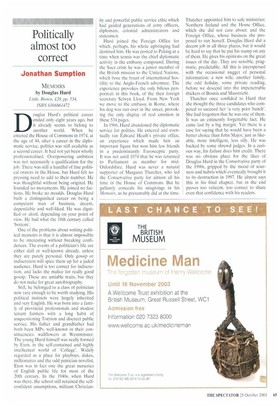Politically almost too correct
Jonathan Sumption
MEMOIRS by Douglas Hurd Little, Brown, 420, pp. 534, ISBN 0366861472 Douglas Hurd's political career ended only eight years ago, but it already seems to belong to another world. When he entered the House of Commons in 1974, at the age of 44, after a career in the diplomatic service, politics was still available as a second career. It had not yet been wholly professionalised. Overpowering ambition was not necessarily a qualification for the job. There was still a handful of fine political orators in the House, but Hurd felt no pressing need to add to their number. He was thoughtful without being original. He founded no movements. He joined no factions. He broke no moulds. Douglas Hurd built a distinguished career on being a competent man of business, decent, dependable and well-liked. He was dignified or aloof, depending on your point of view. He had what the 18th century called 'bottom'.
One of the problems about writing political memoirs is that it is almost impossible to be interesting without breaking confidences. The events of a politician's life are either dull or well-known already, unless they are purely personal. Only gossip or indiscretion will spice them up for a jaded audience. Hurd is too correct for indiscretion, and lacks the malice for really good gossip. These are amiable traits, but they do not make for great autobiography.
Still, he belonged to a class of politician now rare enough to be worth studying. His political instincts were largely inherited and very English. He was born into a family of provincial professionals and modest tenant farmers with a long habit of unquestioning Toryism and discreet public service. His father and grandfather had both been MPs, well-known in their constituencies, wallflowers at Westminster. The young Hurd himself was really formed by Eton, in the self-contained and highly intellectual world of 'College'. Widely regarded as a place for playboys, dukes, millionaires and the odd patrician novelist, Eton was in fact one the great nurseries of English public life for most of the 20th century. In the 1940s, when Hurd was there. the school still retained the selfconfident assumptions, militant Christian
ity and powerful public service ethic which had guided generations of army officers, diplomats, colonial administrators and statesmen.
Hurd joined the Foreign Office for which, perhaps, his whole upbringing had destined him, He was posted to Peking at a time when tennis was the chief diplomatic activity in the embassy compound. During the Suez crisis he was a junior member of the British mission to the United Nations, which bore the brunt of international hostility to the Anglo-French adventure. The experience provokes the only bilious penportrait in this book, of the then foreign secretary Selwyn Lloyd. From New York we move to the embassy in Rome, where his dog was run over in the street, provoking the only display of real emotion in these 534 pages.
In 1966, Hurd abandoned the diplomatic service for politics. He entered and eventually ran Edward Heath's private office, an experience which made him an important figure but won him few friends in a predominantly Eurosceptic party. It was not until 1974 that he was returned to Parliament as member for midOxfordshire. Hurd was never a natural supporter of Margaret Thatcher, who led the Conservative party for almost all his time in the House of Commons. But he gallantly conceals his misgivings in his Memoirs, as he presumably did at the time. Thatcher appointed him to safe ministries: Northern Ireland and the Home Office, which she did not care about: and the Foreign Office, whose business she proposed to run herself. Douglas Hurd did a decent job in all three places, but it would be hard to say that he put his stamp on any of them. He gives his opinions on the great issues of the day. They are sensible, pragmatic, predictable. All this is interspersed with the occasional nugget of personal information: a new wife, another family, the odd holiday, some private reading, before we descend into the impenetrable thickets of Bosnia and Maastricht.
Thatcher once confided to Hurd that she thought the three candidates who competed to succeed her 'a very poor bunch'. She had forgotten that he was one of them. It was an eminently forgettable fact. He came last by a big margin. Yet there is a case for saying that he would have been a better choice than John Major, just as likeable, more intelligent, less silly. He was backed by some shrewd judges. In a curious way, his failure does him credit. There was no obvious place for the likes of Douglas Hurd in the Conservative party of the 1990s, gripped by the mood of sourness and hubris which eventually brought it to its destruction in 1997. He almost says this in his final chapter, but in the end proves too reticent, too correct to share even that confidence with his readers.


































































































 Previous page
Previous page